Reality Check: Your questions answered
- Published
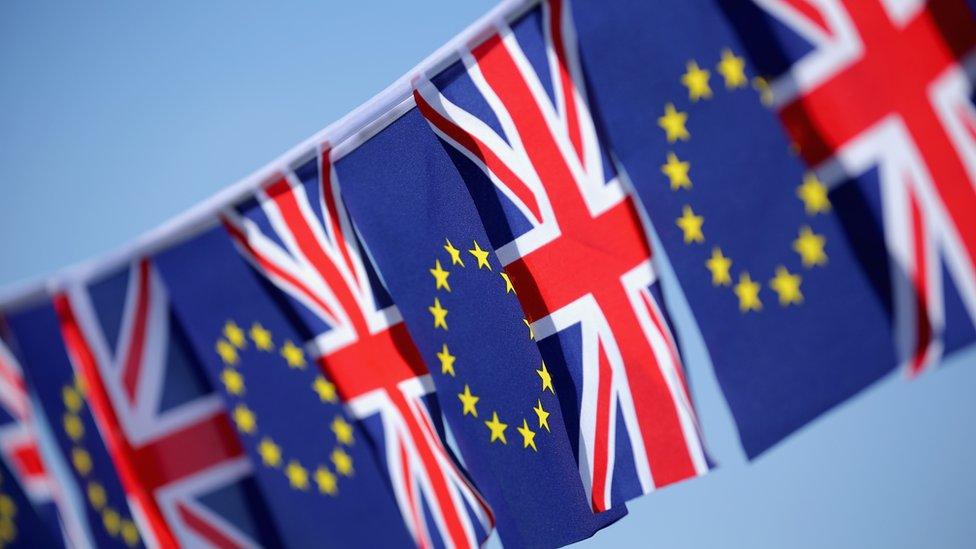
It is more than four months since the UK voted to leave the European Union. For Radio 4's PM, the BBC's Europe correspondent Kevin Connolly and assistant political editor Norman Smith, are working with the BBC's Reality Check team to answer your questions about what Brexit means.

Adrian Wallis runs a small electronics company and wants to know about export tariffs after Brexit, and what they'd mean for his business.
Kevin Connolly says:
As long as Britain has been in the EU we haven't really talked much about tariffs. That's because all trade within the European Economic Area is tariff-free. On top of that the EU has trade agreements with 52 other countries as well.
After Brexit, Britain is going to have to negotiate new deals all on its own. That's both a problem and an opportunity.
For example you can use tariffs against foreign imports to protect businesses you care about, as the EU does with agricultural produce, but you do then run the risk of retaliation from your trading partners.
The key body in all of this is the World Trade Organisation and at the moment the UK is only a member via its membership of the EU.
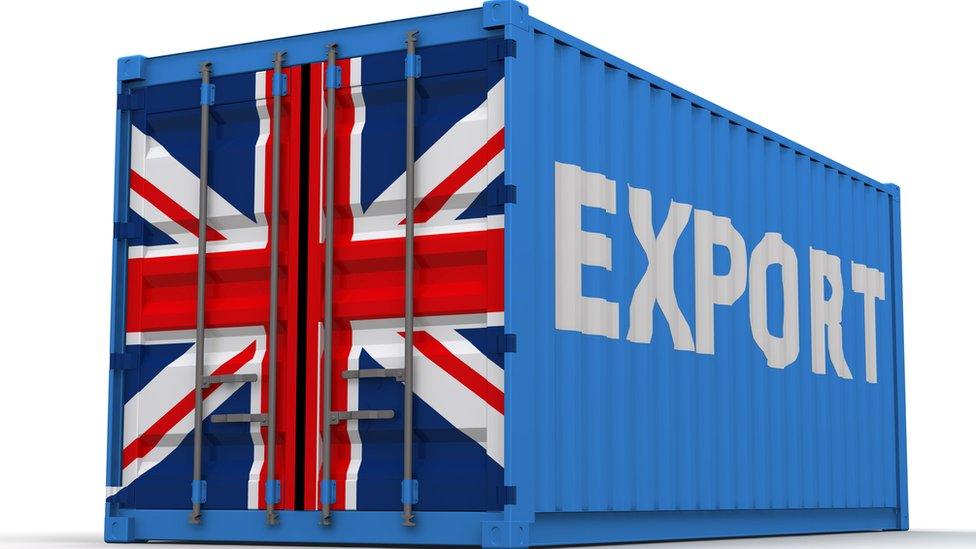
One bit of good news is that the UK will automatically become a member in its own right as soon as it leaves the EU.
That matters because in the period when the UK is negotiating a new trade deal with the EU, and that could take years, trade would be conducted under WTO rules.
At the moment, for non-food items, that implies an average tariff of about 2.3%
But suppose the EU were to impose a 10% tariff on UK car imports, for example. Well, then the UK could impose the same tariff on German and French cars.
In theory, an economist would say that creates a situation where everyone has an incentive to sort out a better deal for their consumers.
The snag is that these things take years, if not decades. They tend to be done on a country-by-country and sector-by-sector basis.
So if Adrian is waiting to find out the implications for his business, then I'm afraid he's going to have to be patient.
Maybe very, very patient.

Eric Degerland asks when UK passports are going to change.
Kevin Connolly says:
This takes us to the heart of an issue that lots of people really care about. It will be a real and palpable sign of Brexit when there is a new UK passport without the words "European Union" on the front cover.
Sadly, the short answer is we don't really know when the change will come about.
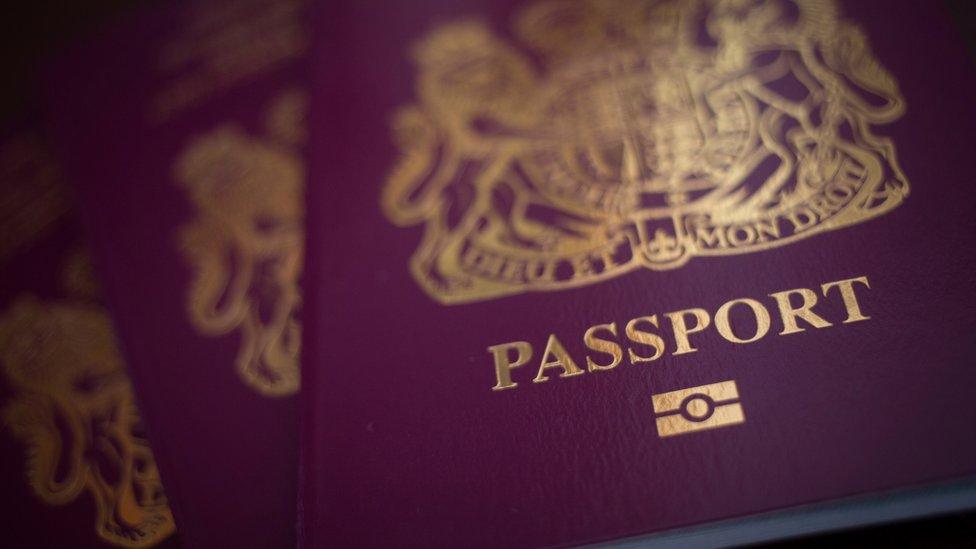
But we can say that the cheapest thing for the government to do would be to phase in the new passports as people's old ones expire.
So if you're looking forward to getting back that blue hard-back passport we had in the old days, you may have a long time to wait.

What impact will leaving the European Union have on our long term political influence in Europe, asks Peter Hoare.
Norman Smith says:
There are basically two views on what will happen in terms of our clout when outside the EU.
View one is that we project power and influence in the world, working through organisations such as the EU and that on our own we'll be a much diminished force.
View two is that unencumbered by the other 27 members, we can get on with things and start adopting a much more independent, self-confident, assertive role on the world stage.
My take is that not much is probably going to change.
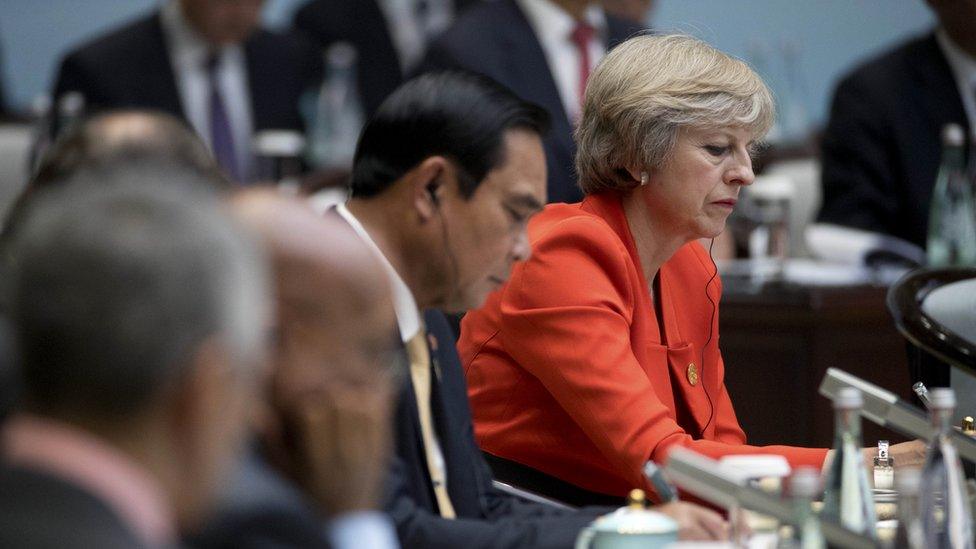
I say that because we'll still be a member of significant organisations such as the UN and Nato, and we'll still be co-operating with our EU partners. For example, we'll still have close ties on defence with the French.
We'll still be the same old Britain, we'll still have significant military force, we'll still be a wealthy country and we'll still be a nuclear power, so I don't think people will suddenly think we're an entirely different country.
If we think of ourselves as a smaller, more inward-looking, less confident country, then that will probably impact on how people view us.
On the other hand, if we think we're doing okay and that we're outward-looking and optimistic, then that will probably be reflected in how people view us and our place on the world stage.

How will the cost of goods be affected, asks Brian Turner.
Norman Smith says:
In the short term, it is blindingly obvious to everyone that the pressure in the shops is for prices to go up because the pound is taking a hammering, largely because of a wobble over the British economy and what life is going to be like outside the EU.
Secondly, there may well be pressure on prices if we get into the whole business of tariffs, and because we import more that we export that too will hit prices in the shops.
On the other hand, you could argue that free of EU regulations and rulings maybe British businesses will become leaner, meaner and more competitive and that will drive down prices.
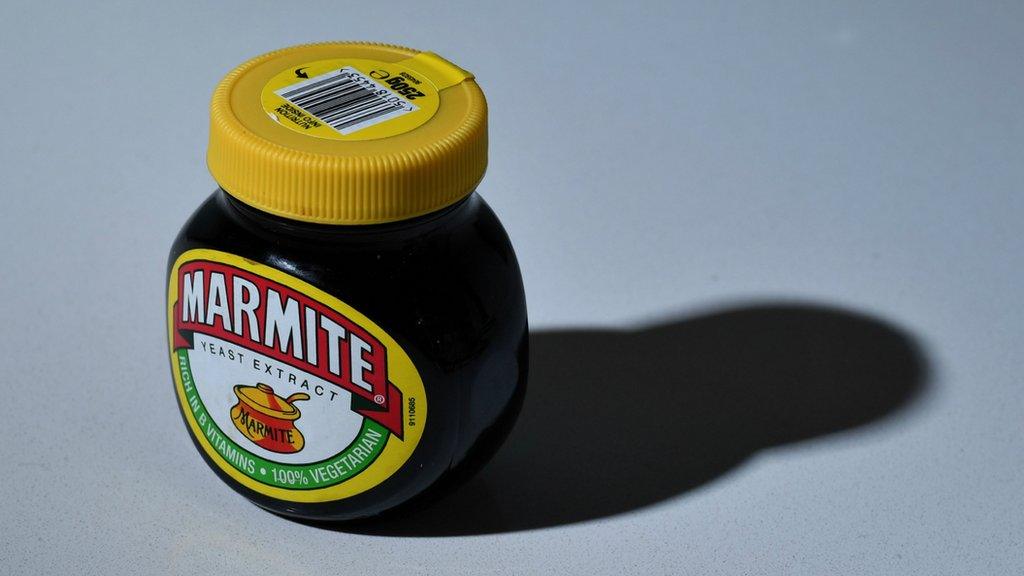
I think, bluntly, it is all going to depend on what happens to UK plc.
If the British economy does well then the pound strengthens, therefore we can all buy things more cheaply and we can go on summer holidays without paying a fortune.
On the other hand, if the British economy struggles post-Brexit, then I am afraid it is quite likely that prices in our shops will continue to go up because of a weak pound.

Are other countries likely to leave the EU and if so could we start a new free trade area, asks David John.
Kevin Connolly says:
Funnily enough, I was discussing this question just the other day with a French politician, a conservative and a real Europhile, and he said he thought if there was a free vote in France tomorrow, as the right wing National Front would like, that the French would vote to leave.
But generally speaking I can't see much prospect of a tidal wave of insurrectionist, exitism sweeping the continent.
When a country like Ireland has a spat with the EU about tax, for example, it does annoy Irish politicians, but most mainstream leaders in the Europe have grown up with the idea that the EU has brought peace and prosperity for decades.
Lots of them see plenty that irritates them about the European Union, but they mainly argue that the benefits hugely outweigh the irritations.
And in countries where you do find euroscepticism, such as Poland and Hungary, there is also a healthy awareness that there are huge financial benefits to membership.
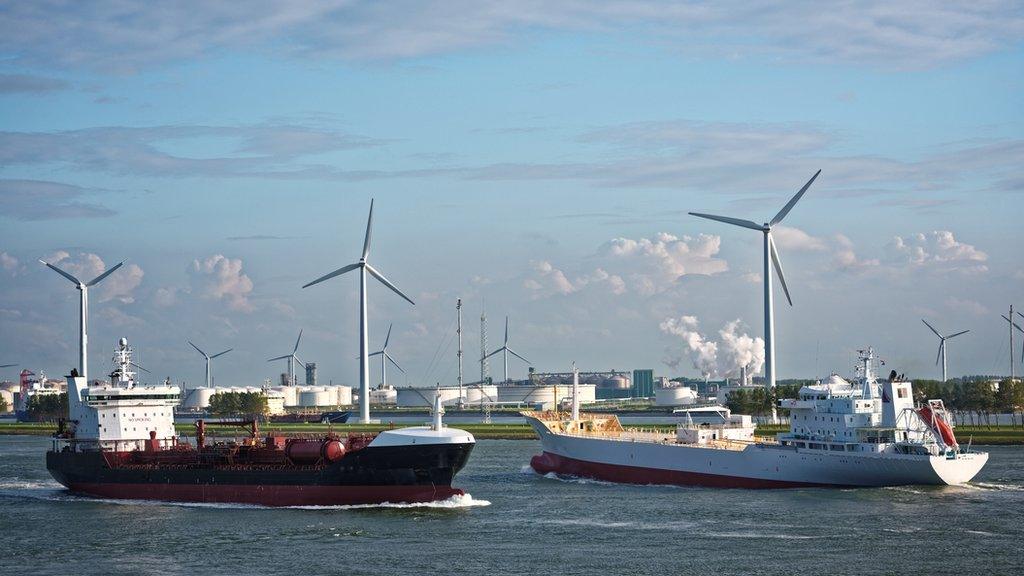
As for the future, we will see.
If England were to get a fantastic Brexit deal then maybe others would be tempted to go.
But the truth is, lots of European politicians want the EU to be tough with Britain precisely to stop other countries from following it through the door.
As to Britain forming its own free trade area, I think it seems an awfully long shot and on balance it is unlikely, not least because there are not that many free countries around available to recruit into another free trade area.
Britain could perhaps join the Free Trade Association along with Norway, Lichtenstein and Switzerland.
But of course it would be joining under existing rules, so the likeliest future for a post-Brexit UK, I think, is a future where it tries to do the best deal possible with the EU and then looks around for other free trade deals.
But that would fall short of creating a free trade area based on the UK itself.

What evidence is there that European leaders will be willing to compromise on the single market, asks Matthew Wilde.
Kevin Connolly says:
I think Matthew has identified one of the toughest issues facing the Brexit negotiating team.
European leaders talk all the time about the four freedoms of movement: goods, services, capital, and people, and they generally portray them as indivisible.
And I think you have to understand they are not just seen as economic propositions either.
Enthusiastic supporters of the EU would argue that they are cornerstones of peace, prosperity and stability.
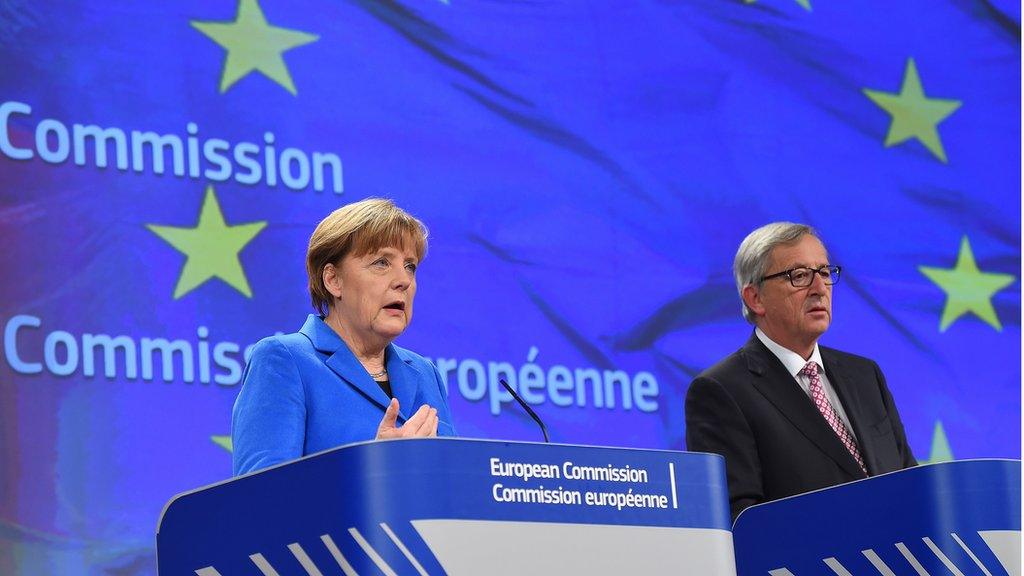
If the UK wants to stay in the free-market for goods, services and capital, but opt out of the free movement of people because of fears about migration, then it is going to be seen as wanting the benefits of membership without paying the price.
And EU leaders such as Angela Merkel and Jean-Claude Juncker have been queuing up to say you can't have one without all of the others.
You could argue that is a starting point for negotiations on their side, but I think it might well end up become a sticking point in talks too.
And I have heard the same sort of thing being said in France, Slovakia, Poland and Spain in just the last few weeks.

What will happen to the borders in Gibraltar and Northern Ireland, asks Nigel May.
Kevin Connolly says:
I think the question of what is going to happen to difficult borders after Brexit is one of the most difficult of the lot.
Since 1985 when Spain joined the EU, it has basically been prevented from closing the border with Gibraltar as a way of applying pressure to the British territory.
In fact, 12,000 Spanish people cross into the territory to work every day and the area of Spain around Gibraltar is a pretty depressed area so they are important jobs.
On the other hand, the Spanish have talked openly about this being an opportunity to get Gibraltar back. Jose Manuel Garcia-Margallo, its minister of foreign affairs, said in September the UK's vote to leave the EU was "a unique historical opportunity in more than three hundred years to get Gibraltar back".
But at a minimum, as things stand, it looks to me as though they could certainly re-impose border controls if they chose to.
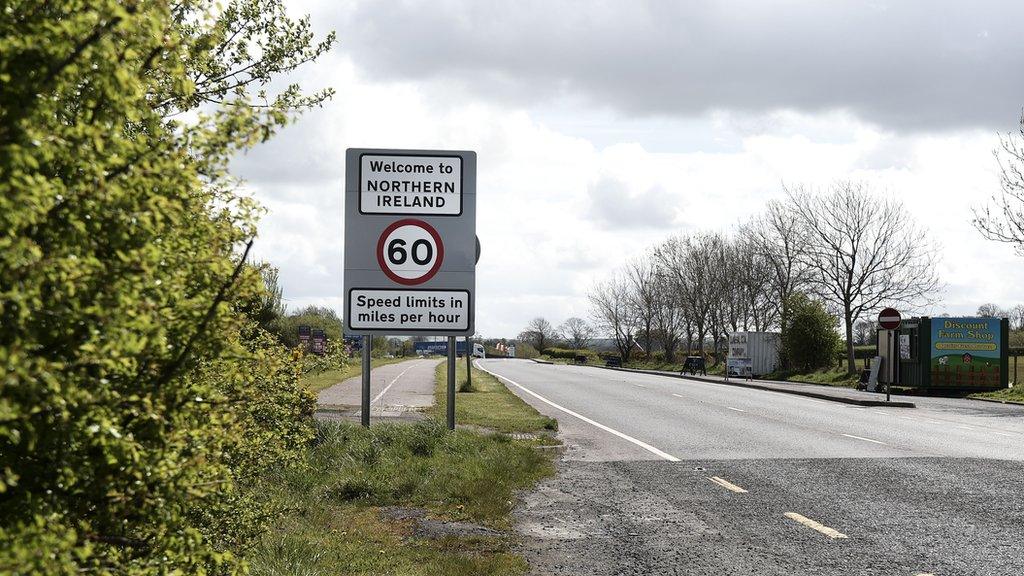
The situation with Ireland's border is more complex.
For those of us for whom Northern Ireland is home, the total disappearance of military check points on the border is one of the most tangible daily reminders of the end of the troubles and no one wants a border like that back.
But, when the day comes when Ireland is in the EU and the UK is not, then the Irish border of course is also going to be the UK's land border with the European Union.
The prime minister has said we don't see a return to the borders of the past, but the reality is that if Britain leaves the common customs area, then presumably some sort of checks are going to be necessary on that border.
And if the UK wants to stop Polish or Romanian migrant workers using Dublin airport as a back door into the UK, then it is going to have to do something about that too.
Of course, what it will all mean for towns and villages like Belleek and Belcoo in County Fermanagh, which more or less straddle the border, is hard to imagine.

How much has Brexit cost so far and how much will it cost by the end, asks Simon Johnston.
Norman Smith says:
I think the truth is, no one truly knows what the costs will be of leaving the EU.
That is in part because it is at the very centre of the whole row over Brexit, so if you talk to Brexiteers then they assume we will be "quids in" by leaving the EU, if you talk to Remainers then they assume it is going to be a catastrophe.
We simply don't know because we don't know what is going to happen to the economy, whether it is going to prosper or whether it is going to flounder.
We don't know whether we are going to face tariffs or whether we will have continued free trade, what sort of deals we might get with other countries in different parts of the world and what is going to happen to the City.
In short, we do not know what is going to happen to the economy and therefore we can't honestly say what are going to be the true costs of Brexit.
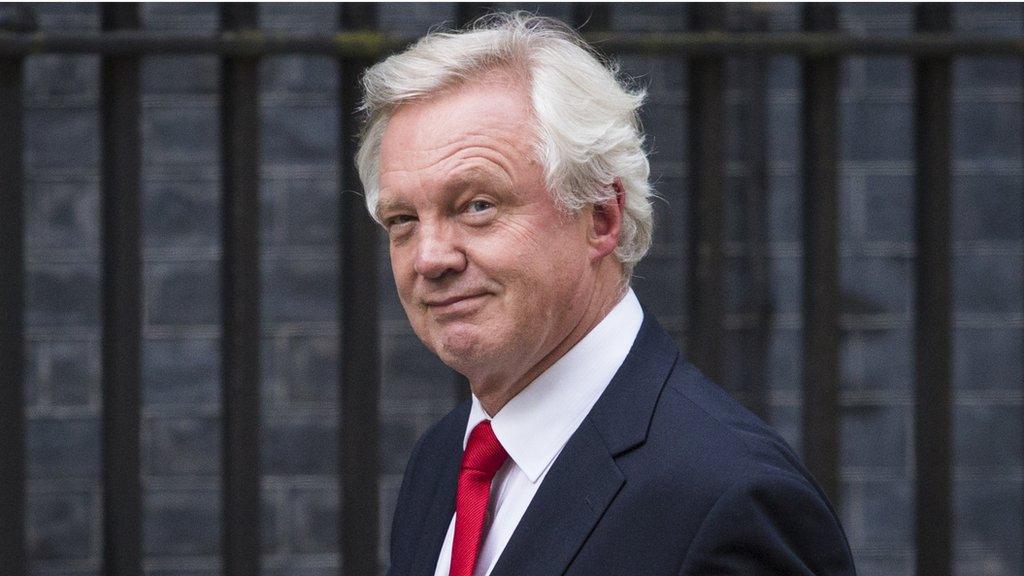
What we can perhaps get some sense of is the administrative costs of making Brexit happen, because we do know the government has already set up a new Brexit department under David Davis, situated in number 9 Downing Street and already they have got around 200 staff, so their salaries will of course have to be paid for.
Many of them have been transferred from other government departments, predominantly the Foreign Office, but presumably those posts will have to be backfilled, so you have to pay for the setting up of a new department.
Already they are busy preparing the ground work for Brexit, they have responded to around 235 written questions in the House of Commons, but in terms of their overall budgets so far they simply say that detailed work is underway over the scale of their budgets, so even there we do not know.
But there will be the cost of an additional government department to manage Brexit.

How will EU sponsorship of university research be affected, asks Christopher Lindop.
Kevin Connolly says:
I think this is a really interesting issue and I know there is a lot of fear around this area, and there has even been some talk that European researchers at the moment are being put off applying for funding for joint projects with British partners.
At the moment, EU research funding is organised under a programme called Horizon 2020 and of course Britain, with a long scientific tradition, is a big player in all of that.

Perhaps for that reason it is also one of those areas where the government has already done something, essentially it said it would pick up the tab for any EU research funding that is agreed before Britain leaves the EU.
So if you secure funding in 2017 that stretches on to 2025 then that funding is guaranteed.
Again, a lot is going to depend precisely on what deal the UK can negotiate, but if you look at Horizon 2020, Israel for example has associate membership through a long-standing agreement.
I suppose there is no reason to think, in the end, that the EU would offer something to Israel that it wouldn't also offer to a post-Brexit UK.

How will access to healthcare change for expats living in the EU, asks Veronique Bradley, who lives in Italy.
Kevin Connolly says:
Healthcare is one of those issues that remains relatively simple as long as the UK remains in the EU.
It is just part of a range of citizens' rights that apply across the entire union. After Brexit, I suppose there will be two possibilities.
The first and easiest would be that the negotiators come up with a reciprocal deal that keeps the current arrangements, or something a bit like them, in place.
If they don't, the situation will depend on the individual country where you live.

For the Bradleys in Italy, for example, residents from non-EU countries, and that will soon include the Brits, will have to finalise their resident status, acquire an Italian identity card and then apply for an Italian health insurance card.
If they visit the UK at the moment, access to the NHS for non-resident Brits is not straightforward unless you have a European health insurance card.
The right to treatment is based on residency, not on your tax status.
So, even if you live abroad and pay some British tax on a buy-to-let property for instance, you might find yourself getting a bill for any NHS treatment you end up getting while you are back in the UK.

What will happen to EU nationals who lived and worked in the UK and now receive a British state pension, asks Peter Barz, a German citizen living in the UK.
Norman Smith says:
If you are an EU national and you get a British state pension, nothing much should change, because the state pension is dependent not on where you come from, but on how long you have paid National Insurance contributions in the UK.
So it doesn't matter whether you come from Lithuania or Latvia or Transylvania or Timbuktu, what counts is how much you have paid in terms of National Insurance contributions.
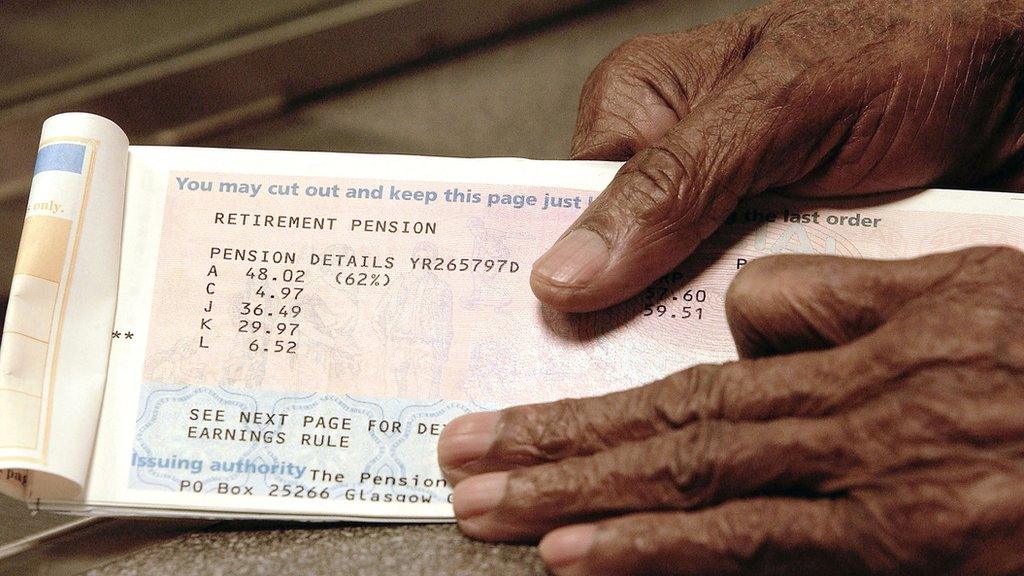
There is one wrinkle though and that is that you have to have paid in for at least 10 years.
Under the current rules, if you are an EU citizen and haven't paid in for 10 years, you can point to any contributions you have made in your native country and say, "I paid in there", and that will count.
That works for EU countries and another 16 countries with which the UK has social security agreements.
Once we have left the EU, you will no longer be able to do that unless we negotiate new reciprocal agreements.
If we don't then potentially, if you have paid in fewer than than 10 years' worth of National Insurance contributions, you will not get a British state pension.

Is it possible to be both an EU citizen and not an EU citizen, asks Declan O'Neill, who holds an Irish passport.
Kevin Connolly says:
I should probably declare some sort of interest here as a dual Irish and British national myself.
Of course, anyone born in Northern Ireland has an absolute right to carry both passports.
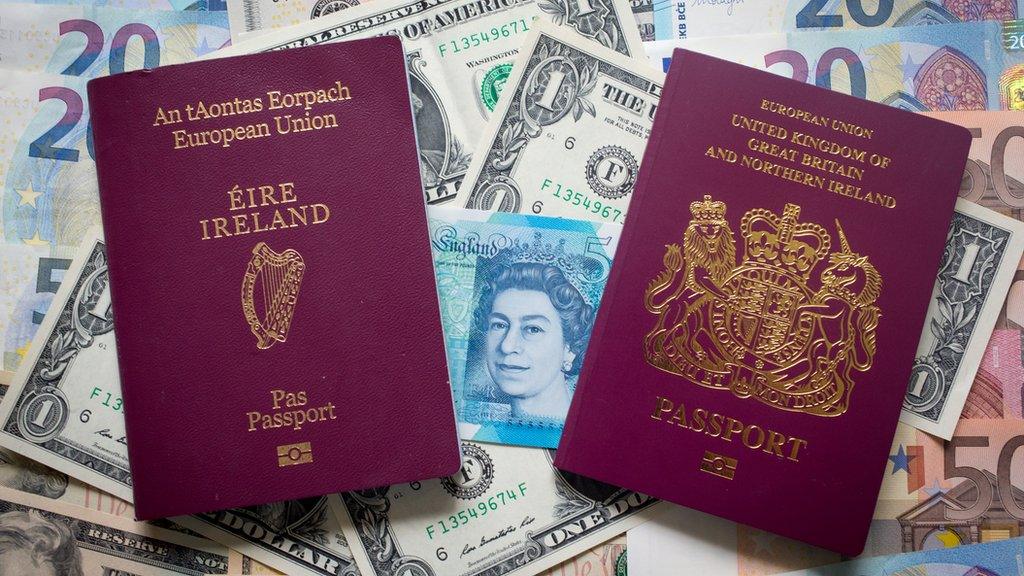
Declan might be happy to know that this is one of the few questions where I can't see a downside as long as you are happy and comfortable carrying both passports.
The Irish document means you continue to enjoy the benefits of EU citizenship, and the British passport will give you full rights in the UK at the same time.
Call it one of the clear joys of coming from Northern Ireland, alongside the rolling hills, rugged coastline and enjoyable breaks between the showers.
All you have to do is remember to carry the Irish passport when you are joining the EU citizens-only queue at the airport in future.

When will we stop sending the EU our subscription fee, asks Colin Spikesley.
Norman Smith says:
The honest answer is we probably won't stop sending money to the EU anytime soon.
Why? Well, because we are going to be a member of the EU until at least 2019, so at least until the spring of 2019 we are going to be paying our annual subs of around £9bn a year.
But even after we have left we may still be tied in to certain arrangements we signed up to, for example, to fund research or economic development projects in the EU, and just like with any other contract, once you have signed on the dotted line you have to fulfil it.
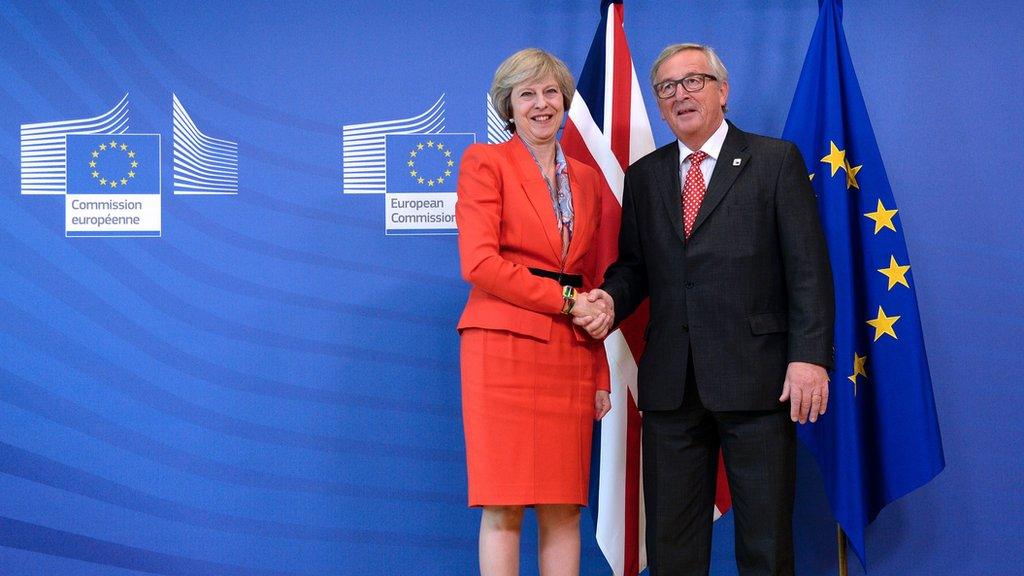
So we could still be paying money into the EU for those sorts of projects and there is the possibility that, should we choose, we could decide to keep paying money into the EU to ensure continued access to the single market.
In other words, the idea has been mooted in Whitehall that maybe we ought to slip the EU a few billion quid to allow us to continue to trade freely with the single market.
So in short, the idea we are going to stop handing money over to the EU anytime soon is probably a bit wide of the mark.

What will happen to expats living in the EU but receiving their pensions, asks Dr Denise Burman, who has been living in France for 20 years.
Kevin Connolly says:
I think lots of the concerns that people are raising are about the fate of British people who have settled elsewhere in the European Union during British membership.
There are about a million of them and, of course, for people who retired to France or Italy or Spain or Germany, in theory that means state pensions.
At the moment, Brits living anywhere in the European Economic Area, which is the EU plus a few others, get pension increases in line with inflation, and there are a few other countries where Britain has reciprocal arrangements so the same sort of deal applies.
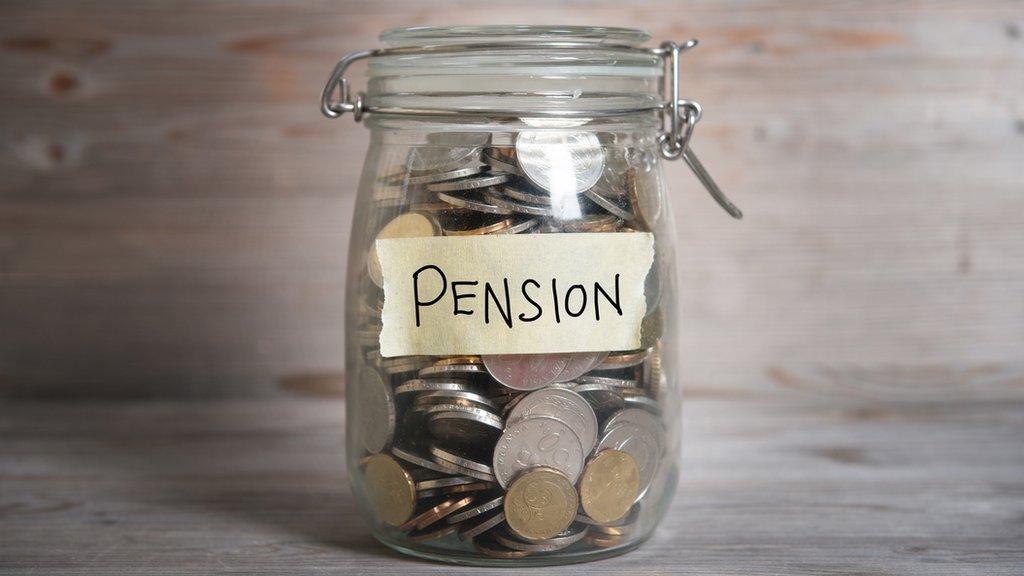
If you retire to a country where Britain hasn't negotiated such a deal, including a few surprising ones such as Australia, then your pension is frozen either at the level you first received it or the level on the day you emigrated.
Britain did have bilateral deals with some countries that are in the EU, including France, before it joined the European Community, so it is possible new deals could be negotiated. But unless the rights of expat pensioners are protected in the long years of negotiations to come, it is possible that you will see pensions frozen.
Correction 23 November 2016: This section has been amended to correct a suggestion that the existence of historical bilateral deals made it likely that pension increases would continue in those countries. However, any future deals will be dependent on the outcome of Britain's EU exit negotiations.

Is there a get-out clause for Article 50, asks Gillian Coates.
Norman Smith says:
I think the honest answer is you would have to be a legal eagle to answer this.
But my take on it is that legally it looks like once we trigger Article 50 we are locked in, and that is certainly how the European Parliament reads it.
And there is a view that if we were in this two-year process after triggering Article 50 and we wanted to get out of it, then ultimately that would be a decision for the European Court of Justice.
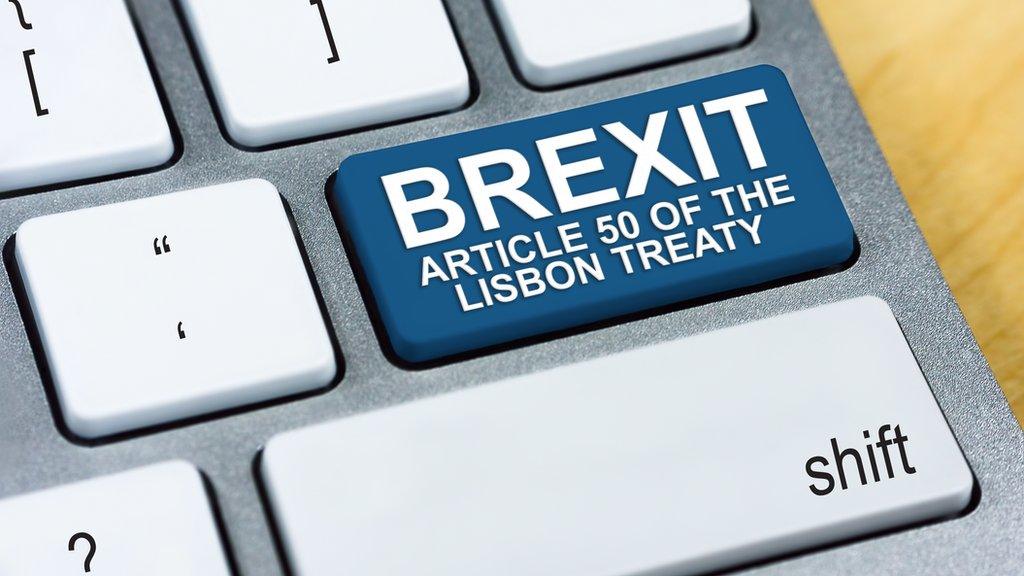
However, in the real world I think it is likely to be rather different, whatever the legal protocol.
I think the truth is, if we were trundling along and decided it was all going to be catastrophic and we have got to pull up the handbrake pretty sharpish, a lot of other EU countries would be probably be laughing at us, but I think at the same time they would probably be quite pleased we weren't going.
Certainly, if you listened to the president of the European Council, Donald Tusk, earlier this month, he was saying yes, the UK could change its mind and he would be delighted if we did.
So I think the short answer is: legally, it doesn't look so good if you want to get out of it, but politically, it probably can be done with the support of other European leaders.
Kevin Connolly and Norman Smith will continue to answer your Brexit questions on BBC Radio 4's PM programme every day this week from 1700 GMT.

- Published28 March 2017
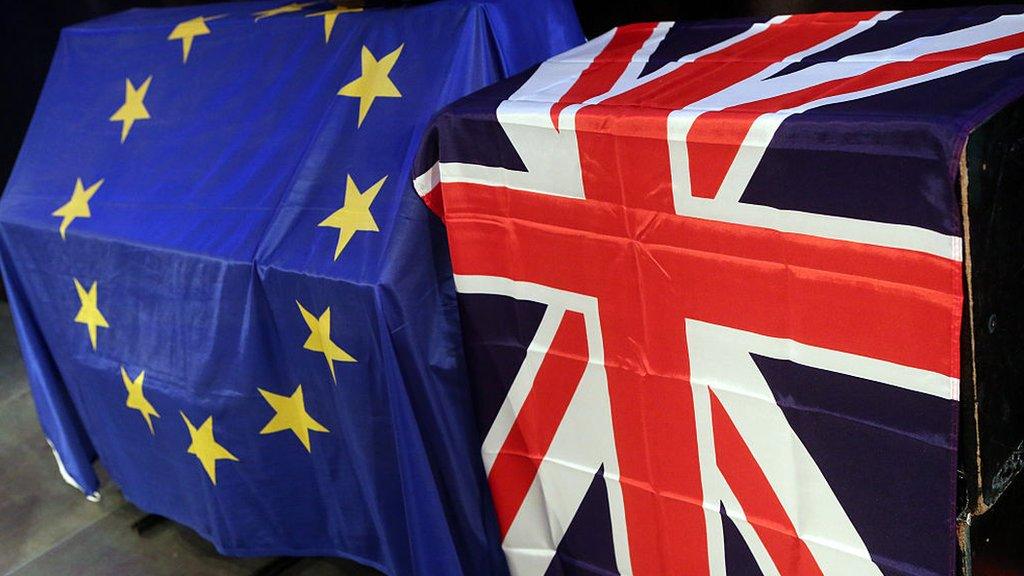
- Published27 October 2016

- Published26 October 2016
- Published30 December 2020
